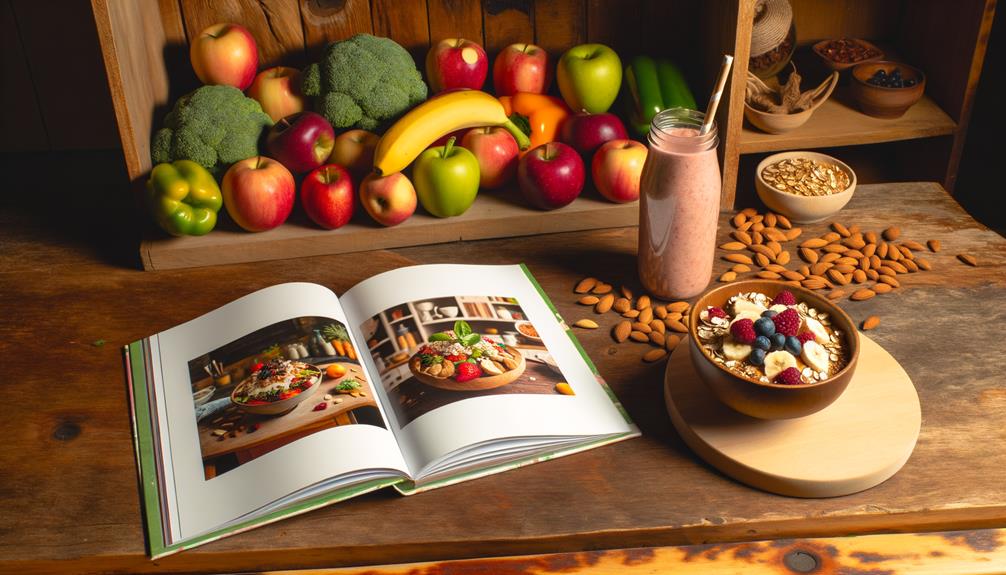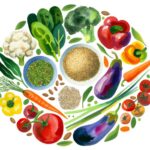Did you know that a staggering 6% of U.S. consumers now claim to be vegan, a six-fold increase from just 1% in 2014? This impressive shift reflects a growing awareness of the health, environmental, and ethical benefits that a plant-based lifestyle can offer. You’re likely considering joining this compassionate movement, seeking not only personal well-being but also a more sustainable way of living. Embarking on this journey, you’ll need guidance to navigate the nuances of plant-based nutrition and culinary exploration. The 12 essential tips we’ve compiled are tailored to ease your transition, helping you to not only sustain but truly enjoy your new dietary choices. As you contemplate the positive changes ahead, it’s crucial to have a reliable roadmap that addresses your concerns and keeps you inspired along the way—let’s explore how you can firmly plant your feet on this rewarding path.
Key Takeaways
- Understanding personal motivations for transitioning to a plant-based lifestyle
- Ensuring adequate nutrition through calorie-dense plant-based foods and healthy fats
- Stocking up on essentials like fruits, vegetables, whole grains, legumes, and plant-based milk alternatives
- Incorporating gradual substitutions and building resilient routines for long-term success
Identify Your Why
Embarking on a plant-based journey starts with uncovering your personal motivations, whether it’s for health, ethical reasons, or environmental concerns. Identifying your why is pivotal as you transition to a plant-based lifestyle. A vegan diet isn’t just about what you’re giving up; it’s a commitment to promoting kindness and wellness, both for you and the world around you.
You’ll discover that plant-based eating is a powerful way to reduce your environmental footprint. Animal agriculture is a significant contributor to climate change, and by choosing a vegan diet, you’re actively participating in the solution. Additionally, the health benefits are compelling. A well-planned vegan diet can help prevent and manage chronic diseases, offering a path to a more vibrant life.
To stay inspired, immerse yourself in the culture: watch documentaries, follow plant-based YouTube channels, and decorate your space with quotes that resonate with your core values. Clear your kitchen of animal products and processed foods, and find your tribe through vegan meetups and online groups. There, you’ll share experiences, swap recipes, and support each other. Remember, this isn’t just about food; it’s about nourishing your soul and serving others by living compassionately and sustainably.
Consume Sufficient Calories
When adopting a plant-based lifestyle, it’s crucial to ensure you’re consuming enough calories to fuel your body’s energy needs. Eating a plant-based diet filled with fruits and vegetables is commendable for its nutrient density, yet you mustn’t overlook the importance of caloric intake. Remember, calories per meal matter to keep your energy levels high and your body functioning optimally.
In your quest to eat plant-based, aim to include calorie-dense plant-based foods like nuts, seeds, avocados, and whole grains. These staples not only sustain you but also provide a wealth of health benefits. Don’t shy away from healthy fats such as olive oil and coconut milk; they can significantly up the calorie ante of your dishes without compromising the ethos of serving others through conscious eating.
Portion sizes and regularity in meals and snacks are your allies in maintaining adequate calorie intake. If you’re ever in doubt, tracking your food intake can be an enlightening exercise to ensure you’re on the right track. The plant-based journey is not one of deprivation; it’s a celebration of abundance. So, enjoy the variety of food groups at your disposal and make every calorie count towards nurturing your body and soul.
Stock Healthy Staples
While ensuring you’re getting enough calories, it’s also essential to keep your pantry stocked with healthy staples that align with your plant-based values. Think of your kitchen as the heart of your plant-based journey—it’s where simple, nutritious meals come to life. Begin by filling your shelves with a rainbow of fruits and vegetables, the foundation of vibrant plant-based meals.
Embrace the wholesomeness of whole grains like brown rice and quinoa; they’re not just sides but the building blocks for nourishing bowls and salads. Black beans and other legumes are powerhouses of protein and fiber, ready to enrich your meal prep with satiety and heartiness.
Remember, nuts and seeds are not only perfect for snacking but also integral for adding texture and healthy fats to your dishes. They’re the secret ingredient in many easy recipes, from creamy sauces to energy balls.
Serving others begins with serving yourself well. By stocking up on these essentials, you’re not just preparing food; you’re preparing for success. Transform your plant-based intentions into tangible, delicious realities, one well-stocked pantry at a time. Your body, and those you share your kitchen with, will thank you.
Plan for Snacking
Snack-time strategy is key in a plant-based lifestyle; ensure you’ve got an arsenal of healthy, ready-to-eat options to keep hunger at bay and maintain your energy levels throughout the day. When you’re on the go or between meals, having the right vegan foods at your fingertips can make all the difference in sustaining your protein intake and overall well-being.
To make snacking a seamless part of your routine, consider these tips:
- Prep Ahead: Dedicate time to prepare convenient snacks like cut fruits and veggie sticks. For a high-protein punch, pair them with peanut butter or hummus, which can provide significant grams of protein per serving.
- Grab-and-Go: Stock your pantry with easy vegan recipes for homemade granola bars or chia seed pudding. These can offer you a quick nutritional boost without the hassle.
- Protein Packs: Roasted chickpeas or trail mix with nuts and seeds are excellent for keeping your protein levels topped up. A small handful can deliver a satisfying crunch and energy lift.
- Diverse Dips: Experiment with a variety of plant-based dips and spreads. They’re perfect to try new flavors and can transform simple veggies into a delectable treat.
Gradual Food Substitutions
After mastering the art of healthy vegan snacking, you’ll find that making gradual food substitutions is a natural next step in enhancing your plant-based journey. Transitioning to a plant-based lifestyle doesn’t have to be abrupt or overwhelming. It’s about mindfully introducing more wholesome, minimally processed food sources into your diet, and lessening your reliance on animal-based and highly processed options.
Start by swapping out dairy milk for plant-based milks such as almond, soy, or oat. These alternatives are not only easy plant-based options but also kinder to the planet. When it comes to protein, look beyond meat. Tofu, legumes, and quinoa are fantastic plant-based sources that can become a staple in your meals.
Embrace cooking techniques that bring out the flavors of vegetables, and don’t be afraid to experiment with plant-based recipes that use avocado or bean burgers as meat substitutes. Whole grains should replace refined ones, and for a natural sweetness, opt for dates instead of sugar.
Adhering to dietary guidelines that prioritize plants will not only serve your health but also align with a compassionate lifestyle. Remember, each small change contributes to a larger impact on your well-being and the world around you.
Begin With Breakfast
Kickstart your day with a nourishing plant-based breakfast, setting the tone for a day filled with wholesome choices and vibrant energy. Let this meal reflect the compassion and mindfulness at the heart of your diet, nourishing not just yourself but also considering the well-being of animals and the environment.
Here’s how you can make your mornings shine with plant-based goodness:
- Experiment with hearty oatmeal bowls or smoothies that pack a punch with nuts, seeds, and fruits for a symphony of flavors and essential nutrients.
- Explore the versatility of tofu or chickpea flour to create vegan scrambles or pancakes—high in protein and satisfyingly delicious.
- Prep your breakfasts in advance; overnight oats or chia puddings are not only easy but also time-savers for those quick-paced mornings.
- Reinvent traditional favorites by trying plant-based recipes for waffles, muffins, or even a simple avocado toast, ensuring you never miss out on the joy of familiar tastes.
Embrace these changes with an open heart, and you’ll discover that a vegan breakfast can be just as exciting and fulfilling as any other. Start a Plant-Based journey each morning; it’s a step towards a kinder, more sustainable world, one plate at a time.
Educate on Nutrition
Educating yourself about plant-based nutrition is a crucial step in ensuring your diet is both healthful and environmentally conscious. By shifting away from red meat to a variety of plant-based foods, you’re not only serving your own health but also the planet’s well-being. Dive into resources and connect with communities that prioritize vegan knowledge. A registered dietitian can offer personalized guidance to make sure you’re getting enough protein, vitamin B12, and vitamin D – nutrients that are often points of concern when transitioning away from animal products.
Leafy greens should become your best friends, packed with iron and calcium, they’re the unsung heroes of plant-based diets. But it’s not just about single nutrients; it’s the symphony of phytonutrients, fibers, and minerals that work together to keep you thriving. Ensuring you educate on nutrition in a holistic way means understanding how whole foods complement each other, providing a full spectrum of benefits.
Connect With Community
Building on your nutritional knowledge, connecting with a community can provide the support and inspiration needed to maintain a plant-based lifestyle. When you’re trying out vegan or fully going vegan, it’s crucial to immerse yourself in a network that shares your values and can offer guidance.
Here are a few steps to connect with community:
- Dive into digital: Engage with the vegan community on social media. Follow pages and join groups that resonate with your journey into a plant-based lifestyle.
- Local and live: Seek out local meetups or create your own. Whether it’s a potluck, a cooking class, or a peaceful protest, these gatherings are golden opportunities to connect and learn.
- Forums and friends: Online forums are a treasure trove of support. Connect with individuals who are also dedicated to serving others through a plant-based lifestyle.
- Listen and learn: Tune into resources like Brownble’s podcast or blog for continual motivation and to find your tribe within the expansive vegan community.
Kitchen Essentials
To truly embrace a plant-based lifestyle, it’s essential to outfit your kitchen with the right tools and ingredients that make plant-centric cooking both easy and enjoyable. You’ll find that a blender and food processor become your allies for whipping up smoothies and sauces, while sharp knives and durable cookware ease the preparation of a rainbow of vegetables and legumes.
Your pantry should overflow with the staples—grains, nuts, seeds—foundational elements of any delicious plant-based meal. Don’t forget to stock up on tofu and tempeh, the versatile champions of plant-based protein, and nutritional yeast for that favorite vegan cheesy flavor. Plant-based milk alternatives are key for everything from your morning cereal to creamy soups.
Adding herbs, spices, and a variety of condiments ensures that your food is never bland, supporting both weight loss and taste satisfaction without relying on animal products. As you cultivate this new plant-based landscape, remember that reusable containers and glass jars aren’t just practical for organization; they’re a nod to the sustainable ethos that often accompanies a fully plant-based way of life.
Build New Routines
As you embark on your plant-based journey, establishing resilient routines becomes the bedrock of maintaining this wholesome lifestyle. You’re nurturing not just yourself but also serving the larger community by reducing demand for animal foods. Here’s how to build new routines with a gentile approach, turning these top tips into second nature:
- Identify Your “Why”: Remembering why you chose a plant-based path every single day motivates you to stick to your new habits. Whether it’s for health, environmental, or ethical reasons, let that purpose guide you.
- Educate Yourself: Arm yourself with practical tips from vegan nutrition guides. Understanding your dietary needs ensures you don’t miss essential nutrients as you move away from animal foods.
- Prepare for Convenience: Always have plant-based snacks on hand. This simple habit helps you resist the temptation to revert to non-vegan options when you’re out and about.
- Embrace Gradual Change: Start by swapping one animal-based item at a time with a plant-based alternative. This way, your diet evolves without feeling overwhelming, and soon, plant-based choices become as habitual as your morning coffee.
Explore Culinary Variety
Once you’ve established a solid plant-based routine, invigorate your meals by exploring the vast array of culinary variety that a vegan diet offers. As one of the common reasons for a shift to foods plant-based is health and compassion, it’s important to make sure you don’t feel like you’re missing out. Delve into the vibrant world of different cuisines and cooking styles. This journey will not only help you feel more connected to global cultures but also enrich your palate.
Experiment with international dishes that celebrate plant-based eating. Mexican, Indian, Ethiopian, and Thai cuisines, for example, offer a wealth of vegan-friendly options that are bursting with flavor. Visit ethnic grocery stores to find authentic ingredients and take a gentle approach to integrating these new elements into your cooking.
Commit Wholeheartedly
Embrace your plant-based journey with conviction, keeping your motives at the forefront to maintain a steadfast dedication to this compassionate lifestyle. You’re not just making a diet change; you’re contributing to a world where every person can thrive without causing harm to animals. Here are vital steps to help you commit:
- Educate Yourself: Dive into documentaries and books that show why others went vegan. Understanding the impact on animal welfare, your immune system, and how you don’t need meat to be healthy across all stages of life will strengthen your resolve.
- Purge Your Pantry: Remove all animal products and overly processed foods. This tangible step reinforces your commitment and makes it easier to choose plant-based options that make you feel great.
- Connect with Community: Finding a support system through online groups or local meetups can offer guidance, shared experiences, and encouragement. They’ve been where you are and can help navigate the path ahead.
- Nourish Knowledge: Regularly update your nutrition know-how with plant-based guides and recipes. A well-planned diet diminishes the risk of heart disease and ensures you’re nourishing your body correctly.
Frequently Asked Questions
What Happens the First Week of Plant-Based Diet?
In your first week, you’ll notice digestive adjustment, energy fluctuations, and craving changes. You’ll adapt to new tastes, focus on hydration, experience mood variations, enjoy better sleep quality, and revamp your shopping habits and meal planning.
How Quickly Will I Lose Weight on a Plant-Based Diet?
You might shed pounds quickly as your body’s metabolism adapts to a caloric deficit filled with nutritious plants. Sustainable habits, like exercise and balanced meals, are key to avoiding weight fluctuation and plateaus.
How Do I Start a Plant-Based Lifestyle?
To start a plant-based lifestyle, prioritize grocery shopping for plant-based proteins and study nutrition labels. Master cooking techniques, plan meals, and find snack options. Ease into diet transition and navigate social dining and eating out.
What Foods Do You Eat on a Plant-Based Diet?
You’ll savor fruit varieties, vegetable diversity, and whole grains, alongside legume options, nut selections, and seed choices. Embrace plant-based milks, herbal teas, and condiment alternatives to enrich your compassionate, health-conscious diet.







